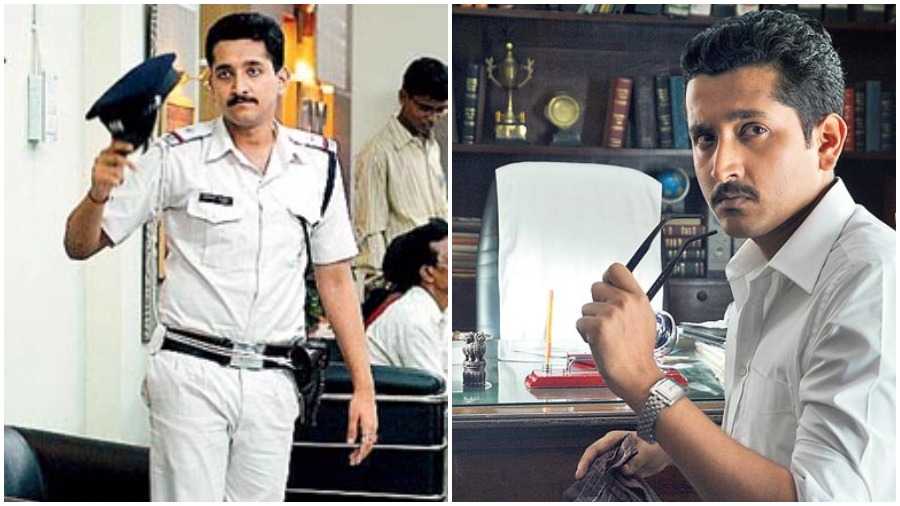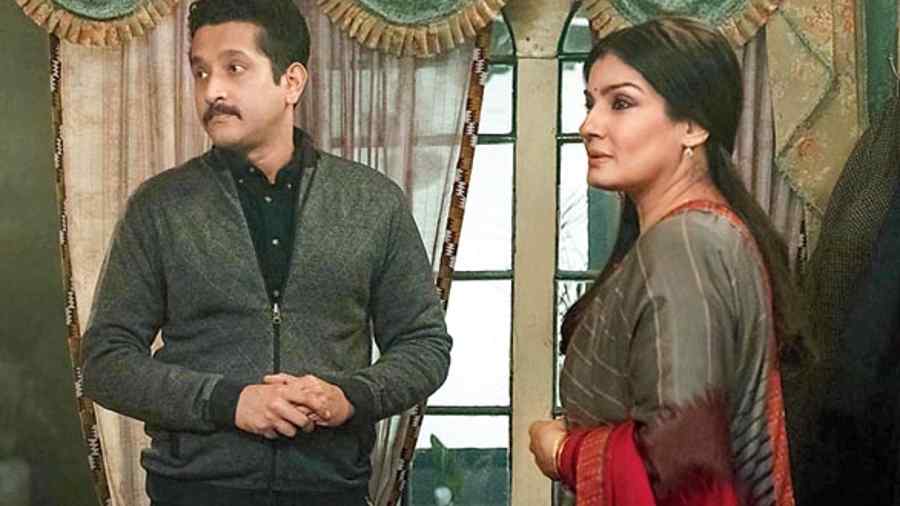In Aranyak that drops on Netflix today, Parambrata Chattopadhyay will be seen as a cop named Angad Malik, in a part that’s parallel in screen time and significance to that of Raveena Tandon’s Kasturi Dogra, who also plays a cop. The eight-episode series takes place in the fictional hill town of Sironah and meshes thrill with drama, while focusing on an urban legend as a killer runs amuck. The Telegraph chatted with Param over a Zoom call on playing Angad, sharing screen space with Raveena (who makes her web debut with Aranyak) and how he’s doing his best work in the Hindi space now.
You have signed on quite a few projects on the web, of which Aranyak is possibly one of the biggest. You have consistently mentioned that this is ‘not a regular story’. For you, what’s special about Aranyak?
Quite a few things, actually. The fact that this series is for Netflix is something that, in itself, carries a lot of weight. Netflix has become synonymous with quality streaming content over the last decade or so. Also, the fact that the series is being produced by Roy Kapur Films and Ramesh Sippy Entertainment speaks a lot about the weightage that the series carries. Any actor would be really keen to be associated with such names.
When I read the concept and we started doing readings of the script, it all fell into place. Aranyak is a very intense, yet in a way quaint, tale. It has drama, a lot of thrill and is, in its own way, very, very entertaining. It is very rooted in a typical Indian small-town setting and is interesting in terms of everything that comes with it — the language, the beliefs, the ideas, the ways of doing things by the people there.... I would say it’s a potent potboiler. It made a lot of sense to me on the creative level as well.
You have played cops before. How would you decode Angad Malik in Aranyak?
I think I have played a cop too many times now! (Laughs) The two main cops acts I am known for are in Kahaani and 22shey Srabon, and its sequel Dwitiyo Purush. I am sure Rana in Kahaani had his own story and his family, a slight glimpse of which we got to see when he calls his mother in the film. But the film never really got into his personal space and we didn’t know where he comes from. We are left guessing, and that’s how it was meant to be.
In 22shey Srabon, we see partially that Abhijit (Pakrashi) carries a chip on his shoulder... the Bengali-medium thing and all that... and that, obviously, turns on its head in the sequel (laughs).
In Aranyak, we have a quintessential flawed man. By flawed, I don’t mean that he’s committed any wrong. But as human beings, our lives really don’t follow the same path. Some of us are less fortunate, some are more. Angad Malik is someone who has been slightly less fortunate with his trajectory so far, and that trajectory has certain ingredients in it which come from his own self. But majorly speaking, he has had a bad run. So, at the inception of this series, we see him trying to build his life and go for a second inning of sorts. It’s a very classical writing trope for central characters. We also get to know in the series what went wrong in his life before he arrives at this moment. So, in this way, there is a very marked difference between the cops that I have played before and the cop that Angad Malik is.

In response to the first question, you said that Aranyak ticked off a box for you at the creative level too. Given that you are a film-maker too, when you are offered a project as an actor, does the director in you also respond to it in some way?
The selves that we have within us are often more overlapping than not. That becomes especially true when it comes to the same medium. So yes, when I am offered a project as an actor, this little film-maker boy in me starts peeking out (smiles). I have never stopped acting even when I am directing, and I am primarily an actor and would like to celebrate that. So I try and keep the director in me in abeyance and tell that person, ‘I know you have thousands of ideas, but you have to take a backseat. This is not where you get to wear the director’s hat. You need to go to a corner, sit yourself down.’ (Smiles)
There are times when things go wrong on a set and that’s when the director in me tries to come out with more zest and zeal. I tend to get irritable, but that happens very rarely. On a project like Aranyak, there was no iota of a possibility that something like this could happen. It’s so well-mounted and so well-crafted that there was no chance for the director in me to pop out.
What was it like sharing screen space with Raveena Tandon? And, in general, how much does your performance in a project depend on that of your co-actors’?
It has to... there is no way it can’t. Especially in a series like Aranyak where Raveena’s character (Kasturi Dogra) and mine are constantly together. The screen time that Kasturi and Angad have individually is about 40 per cent, and the rest is of them together. That is why getting along with such an important co-actor was imperative for me. Raveena and I had started our readings and we got to know each other through the workshops that we did in the three-four months before we started shooting. But everything was happening virtually because we were in the middle of the first lockdown.
And then, we eventually started shooting. I am a ’90s boy... I have grown up with Raveena Tandon as the Raveena Tandon (smiles). It was kind of weird in the beginning for me... I am sure you understand what I mean (smiles). If taken in the right spirit, when we were in Class VII and VIII, Raveena Tandon used to mean something else to us (smiles).... She was this supremely attractive poster-girl of commercial Hindi cinema and we were all waking up to such sensibilities in our teens....
I love how you put it!
(Laughs) I am just trying to make it sound very polite! But after the first couple of days of shooting with her, it started melting down into jokes. I used to tell her about our experience as teenagers. She’s a very lighthearted person and much senior to me. Also, the respect for her as a senior actor was there from my end. And then, we became very good friends, and there was this slightly older friend vibe that persisted throughout the shoot. We shot for a very long time and we became good friends over a period of time.
You burst onto the national scene with Kahaani 10 years ago, but did sporadic work in Hindi post that. Over the last two years or so, you have upped the ante as far as pan-India projects are concerned. What’s changed?
The scope for movie makers has gone up by leaps and bounds because of streaming platforms. The kind of Hindi work I have done in the last two years — both in terms of quality and volume — is something I haven’t done in the seven years prior to that since Kahaani. All of this wouldn’t have been possible without the existence of streaming platforms.
You have been shooting right through the pandemic, or at least for a major part of it. Have you kind of got used to what seems like the new normal and is here to stay?
I have got used to it, I think. I have been working since July 2020, ever since the first set of lockdown relaxations were announced. From July to April this year, I worked constantly, and then the second wave of Covid-19 hit us. I resumed working from July again this year.
I was just shooting in London (for Ghore Pherar Gaan) and they have gone in for a mask-off policy. One can roam around without a mask if one wants to, and most people there are actually doing that. But when I would step out without a mask, I would keep feeling that I am missing something... we have got so used to our masks. I have also got used to that little stick being shoved up my nose (smiles) once a week, if not more. Honestly, it doesn’t create too much of a ripple in my life anymore.
Having said that, there are certain anxieties. I tend to get anxious when I am inside a room filming with strangers within a small space. But we are getting used to all of this. Part of it is precaution, part is fate, part is knowing how to be physically strong.... We have got used to it to a certain extent and it’s not going away anytime soon.
